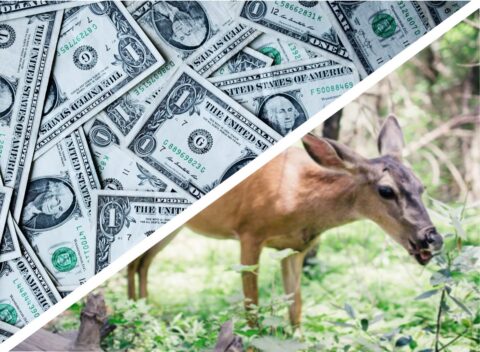Investigation
What Does a Small Town Do When the Water Is Undrinkable?
Climate•8 min read
Reported
Mitigating or fully avoiding the negative effects of extractive, destructive industries and companies is genuine cruelty-free investing. Vegan ETF makes responsible investing easy for anyone.


Words by Mikko Jarvenpaa
 This story is part of Covering Climate Now, a global collaboration of more than 250 news outlets to strengthen coverage of the climate story.
This story is part of Covering Climate Now, a global collaboration of more than 250 news outlets to strengthen coverage of the climate story.On Tuesday, September 10th, US Vegan Climate ETF lanched on the New York Stock Exchange. This sustainable investment instrument is the brainchild of Claire Smith, a financial industry veteran based in Geneva.
ETFs, or exchange-traded funds, are collections of stocks and other instruments that track an underlying index. An index is a portfolio of stocks and other instruments that represents a specific segment of the market. For example, the S&P 500 is an index consisting of the 500 highest-valued public companies in the US. There are many other ways to define an index, and that’s where Vegan ETF is unique. By defining an index that excludes companies harming the planet, animals, and people alike, Vegan ETF is able to create a truly exciting investment opportunity for anyone who cares about what their money supports.
The idea of vegan investing may summon to mind a portfolio heavy on Beyond Meat and a handful of other food products favored by plant-based consumers, but that’s far from the whole picture (as is the tacit assumption that Beyond Meat is for vegans – the overwhelming majority of consumers purchasing Beyond Meat products are not plant-based).
US Vegan Climate Index shows an impressive analysis of the externalities created by $1 of revenue. One dollar of revenue produced by the Vegan ETF creates only 38% of the greenhouse gases, 11% of the waste, and 16% of the water consumption compared to one dollar produced by the Solactive US Large Cap Index (which is similar to the familiar S&P 500 mentioned earlier), which is a cap-weight index consisting of approximately 500 of the largest U.S. companies.
These are dramatic differences and worth repeating. If you invest in the biggest 500 US companies instead of the companies represented in the US Vegan Climate Index, you would be spending 10 times the amount of non-recyclable waste for the same amount of dollar revenue generated in the index. You would also be creating 2.6x the greenhouse emissions, and wasting six times the water.
Regardless of if you are vegan, vegetarian, or omnivore, vegan investing is sustainable investing.
Vegans care about animals, but they care about other things too. Vegan investing is good for the planet and its non-human inhabitants but is also good for its human animals. US Vegan Climate Index also excludes tobacco companies, military and arms manufacturers, and companies that lack transparent, credible policies on human rights.
“In the current market economy,
too much is damaging.”
– Claire Smith
Of course, climate-friendly investing is also humanitarian investing. We know that the climate crisis will likely disproportionately affect the poorest nations on earth, and the brunt of pollution is often borne by the least advantaged populations, even in developed countries like the US.
Mitigating or fully avoiding the negative effects of extractive, destructive industries and companies is genuine cruelty-free investing.
As mentioned, a fund is a portfolio of multiple securities. An index fund follows an index, and there are various ways to construct an index.
Index investing became extremely popular in the 1990s as investors started to realize that active portfolio management was consistently underperforming the market, especially in the long term. The first Exchange Traded Fund (ETF) was launched in 1989. An ETF is a mutual fund that can be traded just like an individual share of a stock, and its trading is tracked on an exchange like NYSE or NASDAQ.
The core idea of an index fund is that instead of investing in individual stocks, you diversify your investment by participating in a market-weighted instrument. For a simplified example, an ETF tracking the S&P 500 would seek to hold a proportionally weighted portfolio of the stocks in the S&P 500 index. If the most valuable company on that list was 10% of the value of the S&P 500, then the fund would seek to invest 10% of its holdings into that stock.
Indexing is popular, because the market as a whole tends to overperform an actively managed portfolio, and buying into an ETF is an easy way to get broad exposure to the market.
Indexes are, however, blind to the qualitative aspects of indexing. For instance, if 20% of the value of S&P 500 was made up by companies producing fossil fuels, by purchasing into exposure in that index, an investor would be putting 20% of their capital in that sector.
In constructing a more purposeful index, the first question then isn’t one of inclusion, but exclusion.
Claire Smith is the perfect instigator for the Vegan ETF. She is an investment and financial markets expert with over three decades of experience. “I think I’m paying penance for my past,” Smith says with a chuckle, continuing to list some of her previous projects and experience. She worked with a company creating a major pesticide, witnessed animal testing while working with a pharmaceutical company, and worked with a major oil refinery. Smith is also the daughter of a dairy farmer, so her close experience with animals goes all the way back.
This background has given her firsthand experience on what investor money shouldn’t go towards. “We are excluding a full 43% of the stock market,” says Smith. “In the current market economy, too much is damaging.” In socially responsible ESG investing (environmental, social and governance), excluding what you don’t want to support is key. “We are the most exclusionary of ESG investment instruments,” Smith says.
Of course, the remaining 57% of the market will also provide a return to the investors.
For the Vegan ETF to beat the performance of a non-selective index, it has to overperform the excluded 43% of the market. Because there are some sectors that get eliminated almost entirely – such as energy, with our continued addiction to fossil fuels – Vegan ETF also goes through some positive selection.
“We add in mid-cap companies to compensate for sector imbalances,” Smith explains. For example, to balance out the negative selection of fossil fuels, there could be a positive inclusion of renewable energy companies in the index.
Index investing is commonly called passive investing as opposed to an actively managed portfolio that attempts to over-perform the market by trading in and out of positions. Interestingly, the popularity of passive investing in market indices has also created another externality. By securing a position among the 500 largest companies, it is comparatively easy for a company to stay among the top 500 thanks to index investing. Not only does an index fund hold the securities as long as they’re part of the index, but new money coming into the market will also disproportionately find its way into the funds passively tracking the index. Due to this dynamic, there is arguably less price discovery in the market than there would be if active investing were more popular. Indeed, the higher in the index you are, the less risk you have from falling out of favor of passive investors.
But Smith sees that selective indexing can be a partial solution to the inertia. “The systemic opportunity with ESG ETFs is the positive feedback loop affecting the passive money sitting in the indexed funds.” In recent years, oil companies have been falling out of the S&P 500 in higher proportion than companies in other sectors. At the margins of an index, the ESG funds can make a difference: by funneling investor money into the more responsible companies, the less responsible companies are likelier to see a drop in relative market capitalization and thus fall out of even the less selective indices.
The careful construction of an ethically responsible investment fund is more important than ever. As Western populations live longer and need to save more for their retirements, the money they are investing is also capitalizing the very companies that are destroying the planet for them and their children. Some industries are more destructive than others. In investment lingo, Smith is long on the non-destructive part of the economy. And short on the other part.
“Fossil fuels are a structural short, and you could say the same about animal agriculture. We can’t afford it,” Smith says. Animal agriculture’s share of the human-originated climate emissions is at least 15%, possibly as high as 51%. The planet cannot, indeed, afford it.